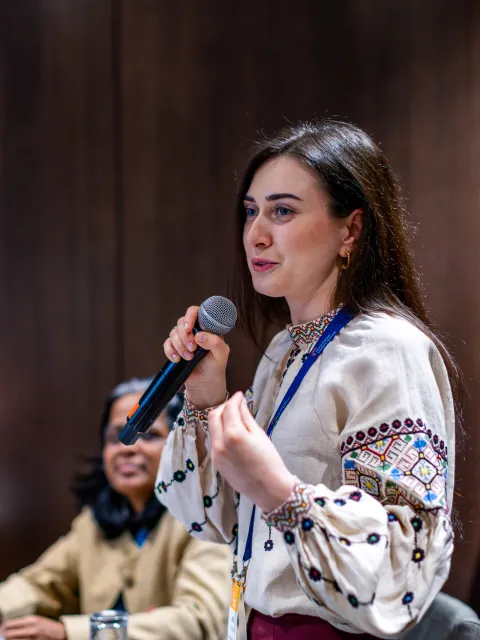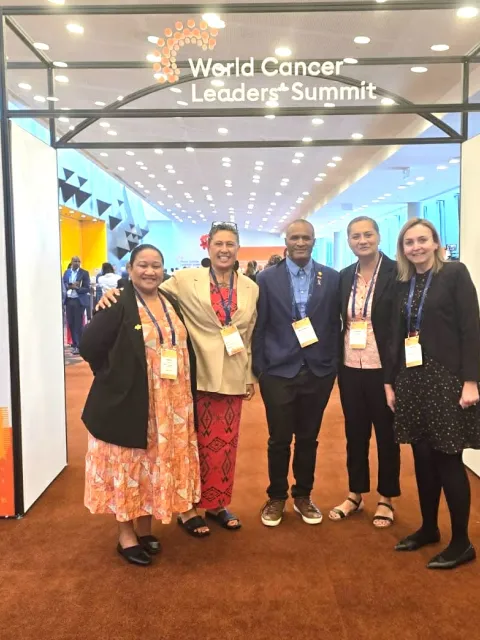First-ever study on the economic burden of cancer care for Syrian refugees
A Lancet Oncology article estimates the cost of maintaining essential services for Syrian refugees in three key host-countries during and after the coronavirus pandemic. UICC offers a Q&A with the authors.

A new study published last week by The Lancet Oncology is the first of its kind to examine the economic burden of cancer in Syrian refugee populations. It estimates that 3,000-7,000 euros per cancer case would be sufficient to provide good quality care. This amounts to 11% of the current annual budget of US$ 345 million for Syrian refugees in Jordan, Lebanon and Turkey (2017 figures).
Humanitarian organisations and host countries are reallocating funding away from cancer, however, in response to the coronavirus pandemic. This could lead to increased suffering and loss of life from cancer among refugees in the next three years and underscores the relatively accessible funding needs that would allow adequate cancer care to continue even during the pandemic. “There is a critical need for UN and bilateral funders such as the UK to ensure balance in support that recognises the growing impact of cancer in these refugee populations,” according to Professor Richard Sullivan, Chair of Research for Health in Conflict-MENA programme.
In a statement issued on the publication of the study, Princess Dina Mired of Jordan, President of the Union for International Cancer Control, a major partner of R4HC-MENA, said that the Lancet findings revealed a pressing need for integrated models of care for refugees with cancer in a situation of confinement and closed borders. “Sustainable, inclusive and comprehensive financing mechanisms will support steps towards universal health coverage in host countries such as Jordan, Lebanon and Turkey, and speed the recovery phase for cancer services and ensure that no-one is left behind.”
The study was led by researchers at the King’s College London Institute of Cancer Policy and Conflict and Health Research Group, and a collaboration between the cancer and palliative care working group with UKRI Global Challenge Research Fund R4HC-MENA programme.
Q&A - Authors

Omar Shamieh,
MD, MBA, Director – Center for Palliative & Cancer Care in Conflict (CPCCC), & Chairman – Department of Palliative Medicine, King Hussein Cancer Center, Amman, Jordan

Dr Deborah Mukherji,
American University of Beirut, Lebanon
What is the prevalence of cancer among refugees in Jordan, Lebanon, and Turkey? And among the refugee population globally?
Cancer diagnosis and treatment in refugee populations is a challenging issue both logistically and politically. Historically, the humanitarian response to a crisis has involved the provision of emergency healthcare with a focus on prevention and management of acute infections. As regional conflicts have become more protracted and refugees and migrants have been hosted in neighbouring countries for years in some cases, management of non-communicable diseases (NCDs) has emerged as a key issue that has not been fully addressed. Due to limitations in access to diagnostic modalities and follow-up, data on the prevalence of cancer in refugees in Jordan, Lebanon and Turkey is incomplete. In this paper, we have extrapolated data from national tumour registries, which themselves have limitations, but we estimate that there are approximately 5,400 to 12,650 cancer cases per year, currently.
In your study, you highlight the fact that among non-communicable diseases in refugee populations, cancer poses particular challenges as a leading cause of mortality, but also because it requires “a robust health system that can deliver and coordinate a wide range of services”. How would the funding you suggest help deliver these services to those who need them?
A comprehensive approach to cancer care in any population involves not only coordination between healthcare teams offering the treatment modalities of surgery, radiation therapy, systemic therapy, and palliative care, but also a capacity for screening and diagnostic services. Data on population cancer incidence and outcome are required for informed policy and resource management which, as mentioned above, can be very challenging to establish in refugee populations.
The health systems of the refugee host nations - Lebanon, Jordan and Turkey - have wide variations in the organisation of these services, including the pathways for access to diagnosis and treatment modalities. Data from the United Nations High Commissioner for Refugees (UNHCR) also published in this month’s issue of The Lancet Oncology have demonstrated the need both for increased funding and standard operating procedures across countries to ensure that individuals have equitable access to care.
In addition, directing financial support for treatment of refugees through the existing cancer care systems in the host countries is a preferred strategy to ensure access to comprehensive cancer services, instead of having two parallel cancer care systems.
Do the cost estimates per cancer case include just the treatment or also the delivery systems?
Cost estimates include treatment and services. A figure alone, however, cannot capture the complexity and organisation required to deliver comprehensive cancer care as outlined above. These estimates are to be viewed within the context of a healthcare system that has the capacity to provide these services as part of a wider healthcare delivery infrastructure.
Cancer care has been severely curtailed as a consequence of the coronavirus pandemic and this study has revealed that less than 40 million euros would sufficiently fund adequate care for Syrian refugees suffering from all cancers. What resources exactly do your findings highlight as essential for refugees and that the UN, bilateral funders, host governments and agencies could provide?
As our data and other studies have highlighted, despite the complexities of cancer care in the setting of limited resources, priority should be given to screening, early detection, and management of common malignancies in this relatively young population. These include childhood cancers and breast cancer in women which can be treated with a curative intent if detected at early stages. Enhancing access to pain management, palliative care as well as psychosocial services is also a funding priority.
Can your methodology and findings inspire and stimulate research into the wider economic burden of cancer care due to the coronavirus, closed borders and confinement, as well as the cost of delayed and/or suspended treatments, screenings, diagnoses and research?
These are very important areas for collaborative efforts to document the impact of the coronavirus pandemic and subsequent impact on cancer outcomes. With these data we can ensure that scarce resources are allocated appropriately to mitigate these consequences as far as possible within different healthcare systems.
What other research on health economics for refugee populations do you feel could and should be conducted?
Building and strengthening research capacities for health economic analysis for all aspects of cancer care is a significant area of need we have identified in the MENA region. The R4HC group is actively working in this area.
The funding necessary to address the burden of cancer care for Syrian refugees in Turkey, Lebanon and Jordan does not seem excessive. How could this study serve to mobilise governments and agencies to address this need and how confident are you that this could happen?
We are confident that our study can work as an eye opener for policy makers and encourage health care professionals and cancer advocates to make a clear call for financial support of cancer care and research for refugees in hosting countries. These data will also be valuable to NGOs working to support refugees and help shape targeted fundraising efforts.
As you mention in your study, “the arrival of refugees has uncovered poorly developed pre-existing services and inadequate health system financing mechanisms” as well as inequalities in coverage between, for instance, Lebanon and Turkey. Do you perceive any difficulties politically in calling on funding for cancer care for refugees? Is there a danger of this being perceived as taking place “at the cost of” host populations, who are also suffering from a lack of cancer care due to the coronavirus and the measures taken to confine it?
It is certainly difficult, given the timing of coronavirus pandemic. However, the cost of ignoring this matter is also very dangerous for the hosting countries - you cannot put cancer on lockdown, we know we will have to deal with more advanced cancers as a consequence. There is hope that international funders will see the benefit of a coordinated coronavirus and cancer response, that benefits both local communities and refugees. One thing COVID-19 has made clear is that, like cancer, this infection does not discriminate, and that we need to shift to holistic solutions.
How do we build on how the pandemic has focussed attention on the fundamental inequalities in health care within societies and shift the discussion from “us” and “them” to one focused on the need for universal health coverage and the right to health for everyone?
The COVID19 pandemic has demonstrated that health inequalities affect whole populations and that different health systems within communities cannot operate independently of each other. Our network is well represented on the COVID-19 and Cancer Taskforce, which will be addressing this topic. We hope that the post-pandemic policymakers will build on this experience to ensure that the challenging task of establishing universal health coverage continues to receive the priority it deserves for the whole population, in all countries.
We hope these data along with the policy review from UNHCR and eloquent editorial all published in the same edition of The Lancet Oncology this month will encourage further informed discussion on the issue of NCD funding for refugees and migrants. Putting this in the context of the COVID19 pandemic, we are concerned that existing health inequalities will widen in all populations. By emphasising the importance of accurate data collection and modelling we hope this will add to the global discussion on cancer care in limited-resource settings in the post-pandemic era.
Last update
Wednesday 01 March 2023
